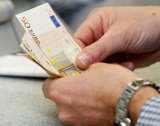АБОНАМЕНТ ЗА НОВИНИ [X]
БГ участие в плана „Юнкер” = 100 млн.€
 06:35 | 01.07.2015
06:35 | 01.07.2015 1845
1845  коментари 0
коментари 0
България ще допринесе със 100 млн. евро за проекти, финансирани от Европейския фонд за стратегически инвестиции, който е основният елемент на Инвестиционния план за Европа. Приносът ще бъде направен чрез съфинансиране на одобрени проекти от Българската банка за развитие. Редица държави-членки, сред които Германия, Испания, Франция, Италия, Люксембург, Полша и Словакия, вече са обявили намеренията си за участие във фонда чрез своите национални банки за развитие.
Националните банки за развитие имат важно значение за насърчаването на инвестициите, се посочва в съобщение на Министерството на финансите. Те притежават нужния опит и експертиза за осъществяването на Инвестиционния план на ЕС, гарантиране на ефективното използване на публичните ресурси и стимулиране на частните инвеститори.
На 24 юни 2015 г. Европейският парламент гласува Регламента за създаване на Европейския фонд за стратегически инвестиции. Фондът по план ще стартира работа до началото на месец септември и се очаква в следващите години да мобилизира допълнителни публични и частни инвестиции в Европа, в частност и в България, за осъществяването на проекти от голямо социално и икономическо значение, както и такива, насърчаващи създаването на работни места, с принос за растежа в дългосрочен план и повишаването на конкурентоспособността. Фондът ще допринесе също и за развитието на малки и средни предприятия, които са гръбнакът на всяка икономика и осигуряват съществен дял от БВП.
Заместник-председателят на ЕК Юрки Катайнен коментира, че скоро ще бъдат видени конкретните резултати от взетото решение. Той отбелязва, че по-рано тази година е обсъдил с премиера Бойко Борисов начините нашата страна да се възползва от фонда.
Ето и оригиналното съобщение на Европейската комисия
Investment Plan for Europe: Bulgaria to contribute €100 million
30 June 2015
Bulgaria has announced that it will contribute €100 million to projects benefiting from finance by the European Fund for Strategic Investments (EFSI), at the heart of the €315 billion Investment Plan for Europe. The contribution will be made through co-financing of projects approved by the Bulgarian Development Bank. Bulgaria is the 8th Member State after Germany, Spain, France, Italy, Luxembourg, Poland and Slovakia to announce a contribution, even before the EFSI becomes operational.
European Commission Vice-President Jyrki Katainen, responsible for Jobs, Growth, Investment and Competitiveness, said: "I am delighted to hear that Bulgaria has announced a contribution of €100 million to the Investment Plan. I had very good discussions with Prime Minister Boyko Borisov when I was in Sofia earlier this year about how Bulgaria could benefit from the Investment Plan and soon we will see the concrete effects of its implementation."
Background
On 28 May, just four and a half months after the Commission adopted the legislative proposal on 13 January, EU legislators reached a political agreement on the Regulation for European Fund for Strategic Investments (EFSI). Member States unanimously endorsed it on 10 March and the European Parliament voted in committee on 20 April. Finance Ministers welcomed the agreement on the Regulation at the ECOFIN Council on 19 June, and the European Parliament voted through the Regulation at their plenary session on 24 June, allowing the EFSI to be operational by September as planned.
In line with the European Council conclusions of December 2014, which invited the European Investment Bank (EIB) Group to "start activities by using its own funds as of January 2015", the EIB has already announced several projects to be pre-financed in the context of the Investment Plan for Europe, in which it is the Commission's strategic partner.
National Promotional Banks have a crucial role to play in getting Europe investing again. They have the expertise to carry out the Investment Plan, and they often ensure the most efficient use of public resources. In February, Germany announced that it would contribute €8 billion to the Investment Plan through KfW. Also in February, Spain announced a €1.5 billion contribution through Instituto de Crédito Oficial (ICO). In March, France announced a €8 billion pledge through Caisse des Dépôts (CDC) and Bpifrance (BPI) and Italy announced it will contribute €8 billion via Cassa Depositi e Prestiti (CDP). In April Luxembourg announced that it will contribute €80 million via Société Nationale de Crédit et d’Investissement (SNCI), and Poland announced that it will contribute €8bn via Bank Gospodarstwa Krajowego (BGK). In June, Slovakia announced a contribution of €400 million through its National Promotional Banks Slovenský Investičný Holding and Slovenská Záručná a Rozvojová Banka.
The economic crisis brought about a sharp reduction of investment across Europe. That is why collective and coordinated efforts at European level are needed to reverse this downward trend and put Europe on the path of economic recovery. Adequate levels of resources are available and need to be mobilised across the EU in support of investment. There is no single, simple answer, no growth button that can be pushed, and no one-size-fits-all solution. The Commission is setting out an approach based on three pillars: structural reforms to put Europe on a new growth path; fiscal responsibility to restore the soundness of public finances and cement financial stability; and investment to kick-start growth and sustain it over time. The Investment Plan for Europe is at the heart of this strategy.
| Tweet |
|













